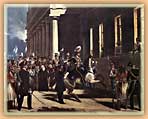 |

The concession of a constitution and the deportation of the Bavarians were the demands of the socio-political forces rallied around the opposition, in which the most prominent political personalities of other parties as well participated from the beginning of 1843. In this case too conspiratorial action was taken: a form of opposition familiar not only to domestic political life in the years of the Revolution and the government of Kapodistrias, but also after the establishment of the independent Greek kingdom. This conspiracy resulted in the Movement of 3rd September 1843, which brought about political change in the field of constitutional monarchy. The political organizers of the movement (A. Metaxas, A. Lontos, K. Zographos, M. Soutsos, R. Palamidis) had won over officers who held important posts in the military apparatus. Thus, their participation in the emergence of the movement was indispensable for its success. The colonels Kallergis (the commander of the cavalry of Athens), Skarvelis (commander of the infantry of Athens) and Spyromilios (commandant of the Military Academy) were those who, in accordance with the plan, would mutiny on the specified date, presenting the palace with a fait accompli. The initial date of the movement had been determined for 25th March 1844 so that it would coincide with the celebration of the Greek Revolution. Thus, it would be consolidated symbolically as well that the movement consisted in a continuation and completion of the struggle for independence. Nevertheless, the fact that no one observed the strict conspiracy rules - zealous Makrygiannis broadcast the secret to many people - hastened the emergence of the movement for the beginning of September 1843. Finally, on the night of 2nd September - since the names of the mutineers had been spread and minor clashes occurred outside the home of Makrygiannis - D. Kalergis, acting on his own initiative, headed to the camps, incited his men and led them to the palace. At the same time he ordered that the prisons of Medrese be opened. Despite the fact that he was ordered to repress the movement, Schinas, the captain of the artillery, joined forces with Kallergis. Under this pressure Otto accepted the claims which had previously been formally approved by the Council of State. After this the soldiers left the palace at dawn on 3rd September and returned to their camps, cheering for the constitutional king.
|
 |